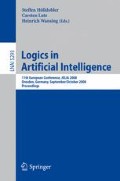Abstract
We consider the problem of how a default rule can be deduced from a default theory. For this purpose, we propose an axiom system which precisely captures the deductive reasoning about default rules. We show that our axiomatic system is sound and complete under the semantics of the logic of here-and-there. We also study other important properties such as substitution and monotonicity of our system and prove the essential decision problem complexity. Finally, we discuss applications of our default rule calculus to various problems.
Access this chapter
Tax calculation will be finalised at checkout
Purchases are for personal use only
Preview
Unable to display preview. Download preview PDF.
References
Gelfond, M., Lifschitz, V., Przymusinska, H., Truszczyński, M.: Disjunctive defaults. In: Proceedings of the KR 1991, pp. 230–237 (1991)
Turner, H.: Strong equivalence for logic programs and default theories (made easy). In: Eiter, T., Faber, W., Truszczyński, M. (eds.) LPNMR 2001. LNCS (LNAI), vol. 2173, pp. 81–92. Springer, Heidelberg (2001)
Zhou, Y., Lin, F., Zhang, Y.: General default logic. In: Baral, C., Brewka, G., Schlipf, J. (eds.) LPNMR 2007. LNCS (LNAI), vol. 4483, pp. 241–253. Springer, Heidelberg (2007)
Reiter, R.: A logic for default reasoning. Artificial Intelligence 13, 81–132 (1980)
Ben-Eliyahu-Zohary, R.: Yet some more complexity results for default logic. Artificial Intelligence 139(1), 1–20 (2002)
Gottlob, G.: Complexity results for nonmonotonic logics. Journal of Logic and Computation 2(3), 397–425 (1992)
Jongh, D.H.J.D., Hendriks, L.: Characterization of strongly equivalent logic programs in intermediate logics. Theory and Practice of Logic Programming 3(3), 259–270 (2003)
Cabalar, P., Ferraris, P.: Propositional theories are strongly equivalent to logic programs. Theory and Practice of Logic Programming 7(6), 745–759 (2007)
Ferraris, P.: Answer sets for propositional theories. In: Baral, C., Greco, G., Leone, N., Terracina, G. (eds.) LPNMR 2005. LNCS (LNAI), vol. 3662, pp. 119–131. Springer, Heidelberg (2005)
Pearce, D.: A new logical characterisation of stable models and answer sets. In: Dix, J., Przymusinski, T.C., Moniz Pereira, L. (eds.) NMELP 1996. LNCS, vol. 1216, pp. 57–70. Springer, Heidelberg (1997)
Lifschitz, V., Pearce, D., Valverde, A.: Strongly equivalent logic programs. ACM Transactions on Computational Logic 2(4), 526–541 (2001)
van Dalen, D.: Intuitionistic logic. In: Gabbay, D., Guenthner, F. (eds.) Handbook of Philosophical Logic: Alternatives to Classical Logic, vol. III, pp. 225–339 (1986)
Lang, J., Liberatore, P., Marquis, P.: Propositional independence: formula-variable independence and forgetting. Journal of Artificial Intelligence Research (JAIR) 18, 391–443 (2003)
Plotkin, G.: A note on inductive generalization. In: Meltzer, B., Michie, D. (eds.) Machine Intelligence, pp. 153–163 (1970)
Muggleton, S.: Inductive logic programming. In: The MIT Encyclopedia of the Cognitive Sciences (MITECS). MIT Press, Cambridge (1999)
Inoue, K., Sakama, C.: Generality and equivalence relations in default logic. In: Proceedings of the AAAI 2007, pp. 434–439 (2007)
Winslett, M.: Updating logical databases. Cambridge University Press, Cambridge (1990)
Eiter, T., Fink, M., Tompits, H., Woltran, S.: Simplifying logic programs under uniform and strong equivalence. In: Lifschitz, V., Niemelä, I. (eds.) LPNMR 2004. LNCS (LNAI), vol. 2923, pp. 87–99. Springer, Heidelberg (2004)
Wong, K.: Sound and complete inference rules for se-consequence. Journal of Artificial Intelligence Research 31, 205–216 (2008)
Geffner, H., Pearl, J.: Conditional entailment: bridging two approaches to default reasoning. Artificial Intelligence 53(2-3), 209–244 (1992)
Nute, D.: Conditional logic. In: Gabbay, D., Guenthner, F. (eds.) Handbook of Philosophical Logic: Extensions of Classical Logic, vol. II, pp. 387–439 (1984)
Bonatti, P.A., Olivetti, N.: A sequent calculus for skeptical default logic. In: Galmiche, D. (ed.) TABLEAUX 1997. LNCS, vol. 1227, pp. 107–121. Springer, Heidelberg (1997)
Lakemeyer, G., Levesque, H.J.: Towards an axiom system for default logic. In: Proceedings of the AAAI 2006 (2006)
Author information
Authors and Affiliations
Editor information
Editors and Affiliations
Rights and permissions
Copyright information
© 2008 Springer-Verlag Berlin Heidelberg
About this paper
Cite this paper
Zhou, Y., Zhang, Y. (2008). Rule Calculus: Semantics, Axioms and Applications. In: Hölldobler, S., Lutz, C., Wansing, H. (eds) Logics in Artificial Intelligence. JELIA 2008. Lecture Notes in Computer Science(), vol 5293. Springer, Berlin, Heidelberg. https://doi.org/10.1007/978-3-540-87803-2_34
Download citation
DOI: https://doi.org/10.1007/978-3-540-87803-2_34
Publisher Name: Springer, Berlin, Heidelberg
Print ISBN: 978-3-540-87802-5
Online ISBN: 978-3-540-87803-2
eBook Packages: Computer ScienceComputer Science (R0)

